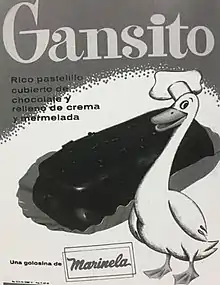Gansito
A Gansito is a Mexican snack cake, described as “a strawberry-flavored jelly and crème-filled cake with chocolate-flavored coating.”[2] It is made and distributed by the Marinela Brand, which is owned by Grupo Bimbo. Gansito Snack Cakes are also available in the U.S., Colombia, Peru, and many countries in Latin America as well as having a limited presence in Europe. In 2019 in the U.S., 5.46 million Americans ate Gansito Snack Cakes 1-3 times a month, 1.24 million ate 4-7 in a month, and 1.31 ate 8 or more in a month.[3] Gansito Snack Cakes are culturally significant to Mexicans and Hispanics worldwide.
 A partial Gansito Marinela Snack Cake. | |||||||
| Type | Snack cake | ||||||
|---|---|---|---|---|---|---|---|
| Course | Dessert | ||||||
| Place of origin | Mexico | ||||||
| Region or state | Mexico City, Mexico | ||||||
| Created by | Alfonso Velasco | ||||||
| Invented | 1957 | ||||||
| Main ingredients | Cream, sprinkles, strawberry-flavored jelly, sponge cake, chocolate-flavored coating | ||||||
| Variations | Double Chocolate | ||||||
| 210 kcal (879 kJ)[1] | |||||||
| |||||||
History

The Gansito Snack Cake was invented in Mexico City, Mexico in 1957 at the Marinela factory. Alfonso Velasco invented the original recipe for the snack cake, while Victor Milke, Guadalupe Pérez, and Roberto Servitje designed the molds necessary to produce the snack cake.[4] At first, the molds only made two Gansito Snack Cakes at a time; today’s can create 18 at the same time.[4] It was one of the first three, individually wrapped snack cakes produced at the Marinela factory, and the first order made at the factory was for 500 Gansito Snack Cakes which took eight hours to create.[4] The Gansito Snack Cake took precedence in the Marinela Brand, and Lorenzo Servitje and Jaime Jorba, two of the original founders of Grupo Bimbo and Marinela, called Gansito Snack Cakes the star of Marinela products.[4]
Gansito Snack Cakes became Marinela’s product leader, representing 65% of all product sales. At first, it only cost consumers 80 cents, and by 1975 Marinela was selling 1 million Gansito Snack Cakes a day.[4]
And the snack cake soon became a beloved product and an all-time favorite in Mexico as Grupo Bimbo expanded through the country and created routes to even the most distant villages.[4] The popular Gansito Character that became a trademark of Marinela and decorates the snack cakes’ packaging was designed by Alfonso Velasco, who was one of Bimbo’s founders. Velasco also created the famous tagline, “¡Recuérdame!” which means, “Remember me!” Gansito Snack Cakes are one-of-a-kind and different from other snack cakes in that they are coated in chocolate-flavored icing and sprinkles and filled with crème and jelly filling. The dessert was first delivered by bicycles and then by unique, three-wheeled motor vans in Mexico called “ganseras.” The salesmen were nicknamed “ganseros”.[5][6] The routes the ganseros sold Gansito Snack Cakes along were called, “rutas ganseras.”[4]
Different Ways of Consumption
Celebrations

One major cultural tradition with Gansito Snack Cakes is to eat them during celebrations.[7] It is common to place one candle or multiple candles on an unwrapped Gansito Snack Cake as a miniature celebration cake and then enjoy the Gansito Snack Cake after the candles have been blown out.
The Frozen or Chilled Gansito
A popular method of consuming Gansito Snack Cakes is eating them after placing them in the freezer or refrigerator for some time. It was first introduced by the brand to bolster summer sales.[7]
Gansito as an Ingredient

As an icon and popular snack cake, innumerable recipes and novel methods of consuming Gansito Snack Cakes have been created throughout the years. Many of these can be seen as tagged on the GansitoMarinelaUSA page on Instagram.
Cultural Significance
The Hispanic Snack Cake
The Gansito Snack Cake has been the snack cake of Mexico for over 50 years, commonly compared to the Twinkie in the U.S.[8][9] From the beginning, the Marinela Brand has worked hard to win over the hearts of its consumers through the Gansito Snack Cake. Jaime Jorba, one of the founders of Grupo Bimbo and Marinela describes the initial response to the first ganseros as noble and welcoming.[4] The introduction of Gansito Snack Cakes created the snack-cake category in Mexico, and the treat continues to dominate the category in Mexico today. Besides Mexico, the cake is an integral snack and icon in many Latin American countries. Gansito Snack Cakes’ unique textures and flavors have made powerful connections with Mexicans and Hispanics, including both children and adults, and the snack cake has become a nostalgic and celebratory treat of Hispanic heritage in the U.S. and globally.[10]
The Gansito Snack Cake and Gansito brand have become representative of Hispanic culture throughout the world. With an emphasis on fun and flavor, heritage, and remembrance, the Gansito Brand positions the Gansito Snack Cake as a cake with the taste, feel, and spirit of Hispanics. To bite into a Gansito Snack Cake is to bite into something inherently Hispanic.

The Gansito Character
The Gansito character is the mascot of the Gansito Snack Cake. He was invented by Alfonso Velasco with the snack cake in 1957, and, although his appearance has changed throughout the years, the Gansito character’s catchphrase has always been, “¡Recuérdame!” which means, “Remember me!”
Today, the Gansito character represents Gansito Snack Cakes as an optimistic, caring anthropomorphized 3D goose who lives the life of a regular Hispanic boy in his teens. He promotes the values of the Marinela and Gansito brands, which are fun and flavor, and he also shows how to consume and enjoy Gansito Snack Cakes on his social media pages. Present wherever Gansito Snack Cakes are, the Gansito character also holds a special place in the hearts of Hispanics.
References
- "Calories in Marinela Cake, Chocolate Filled With Strawberry Jelly & Cream - Nutritional Information and Diet Info". www.fitbit.com.
- "Gansito". Marinela USA. 2017-06-13. Retrieved 2020-11-24.
- "U.S.: servings of Marinela Gansito snack cakes eaten in the U.S. 2020". Statista. Retrieved 2020-11-24.
- Cherem, Silvia. Al grano : vida y visión de los fundadores de Bimbo (Primera ed.). México, D.F. ISBN 978-1-68165-416-4. OCLC 1003219451.
- "Marinela - Gansito - Pinguinos - Submarinos - Sponch! - Barritas". mexgrocer.com. Retrieved 2020-11-24.
- Mrotek, Bob (2008-04-13). "Mexico Bob: El Gansito". Mexico Bob. Retrieved 2020-11-24.
- Sánchez, Mauricio (2015). Gansito® Story Strategy and Framework. Portland, Oregon: Character LLC. p. 21.
- Werman, Marco (2012-11-20). "No Twinkies? No Problem: The Rising Power of Mexico's "Grupo Bimbo"". The World. Retrieved 2020-11-24.
- "Case Study: How Bimbo Turned a Crisis into a Business Opportunity". Brandwatch. Retrieved 2020-11-24.
- Sánchez, Mauricio (2015). Gansito® Story Strategy and Framework. Portland, Oregon: Character LLC. p. 9.
